 Have you ever googled a symptom to try and figure out what is wrong with you without going to the doctor? Have you ever tried to find a “home remedy” online for an ailment?
Have you ever googled a symptom to try and figure out what is wrong with you without going to the doctor? Have you ever tried to find a “home remedy” online for an ailment?
We all have. In fact, looking up information on health and wellness is the third most common use for search engines online, with a reported 72 percent of internet users participating in the activity.
Advertisement
It is this instinct that a group of researchers tried to tap into in a recent study on the effectiveness of online counseling as part of a treatment plan for high blood pressure. They found that adding online therapy to your treatment plan for hypertension can help to lower blood pressure and reduce the risk of developing the cardiovascular disease over the following ten years. The findings were published this week in the American Heart Association journal Circulation: Cardiovascular Quality and Outcomes.
The study included 264 men and women who had been diagnosed with high blood pressure. The group was separated into two, and the experimental group was regularly sent emails with links to videos and interactive tools that included information to teach them about how to improve their cardiovascular health. The control groups received emails with generic blood-pressure-lowering information. After a period of one year, the experimental group showed an average drop of ten points to their blood pressure measurements.
“Internet-based supportive lifestyle counseling does indeed work effectively when it’s clinically organized and when it complements medical therapy,” said the study’s lead author, Robert Nolan. “We were quite pleased that we reached that kind of mark of meaningful reduction.”
Online Counselling Lowers Mortality Rate by 13 Percent
Overall, a ten point drop in the measurement of a person’s blood pressure is related to a 13 percent decrease in the risk of all-cause mortality. The key to the success of the experiment, according to the researchers, was the balance that was achieved. The participants were being given useful information to implement in their own lives, being actively engaged in the online activities, and also being provided with medical guidance from their medical practitioner.
Advertisement
“We aimed for a program that’s in the middle of the spectrum: It’s automated, but it’s also interactive,” said Nolan. “The interactive tools help people self-assess their changes in blood pressure or lifestyle behavior, which is very important. It gives them feedback, builds confidence, and helps them sustain their changes.”
Dr. Lenny López, an associate professor of medicine at the University of California, said, “This paper shows you can do a complicated behavioral change model, with lots of components, and have actual biologic results on blood pressure. One thing that’s important is that [the researchers] were initiating the emails and keeping the interest going. They were re-stimulating the participants. Research tells us that patients want to be reactivated. They want to talk about their results with a nurse or doctor. E-methods are great, but there has to be person-to-person interaction.”
This study had all the components Dr. López mentioned, which is likely why it was so successful. So next time you’re searching for health information online, be sure to double check with your doctor later on.
Also read:
- Essential oils for high blood pressure and how to use them.
- 21 foods that raise blood pressure level
- Yoga for heart health: Yoga poses to reduce the risk of heart disease
